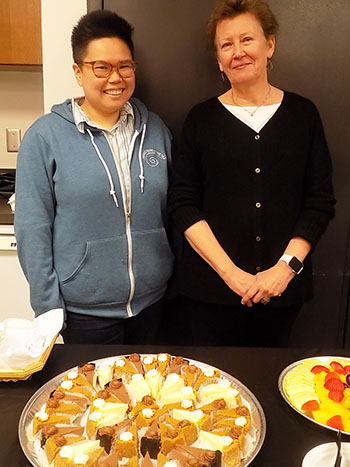On November 21, 2019, Maria Morabe successfully defended her thesis titled, "Nutritional signals for surface colonization by Vibrio parahaemolyticus”. Maria is pictured with her advisor, Professor Linda McCarter, Ph.D.
Research
A vast and microscopic biomass exists on the surfaces of the world around us. Many human interactions with bacteria are with surface-attached organisms. While the predominance of surface-associated bacteria has been known for a long time, our understanding of many aspects of surface colonization is still in progress. My work has focused on one facet of the complex phenomenon of surface-associated bacteria: signals for engaging the surface colonization program of bacteria, specifically surface motility.
time, our understanding of many aspects of surface colonization is still in progress. My work has focused on one facet of the complex phenomenon of surface-associated bacteria: signals for engaging the surface colonization program of bacteria, specifically surface motility.
Vibrio parahaemolyticus, the leading cause of seafood-associated gastroenteritis, is a marine and estuarine bacterium with a highly adaptable lifestyle. V. parahaemolyticus is incredibly motile. In its free-swimming state, motility is driven by a powerful polar flagellum, which can propel the bacterium at speeds of 60 um/s. Even with this strong propeller, the polar flagellum is unsuitable for translocation on surfaces. On surfaces, the lateral flagellar system of V. parahaemolyticus is induced resulting in production of multitudes of peritrichous lateral flagella. Differentiated swarmer cells are primed for surface motility and colonization. My thesis focuses on understanding how environmental signals, particularly iron and nutritional stress, affect this regulatory switch.
In this work, I show that the iron homeostasis regulator, Fur, represses the swarming program. I also discovered a new protein, FcrX, that modulates Fur repression by interacting directly with Fur. I show that swarmer cell differentiation is regulated by nutritional stress via the stringent response alarmones (p)ppGpp. My work adds to our understanding of how nutritional signals are integrated with environmental circumstances to affect surface colonization and survival.
Background
Born in Manila, Maria has made her way further and further inland, with stops in Guam and California. She is the only child of Ceferino and Grace Morabe. Surrounded by her mother’s medical books and her dad’s electronics kits and in possession of several library cards, it was only natural that she developed a healthy devotion to words and tinkering (and tinkering with words).
In high school, she liked all the subjects, but she liked combining them the best. She studied Mathematical and Computational Biology at Harvey Mudd College, which involved taking more math classes than biologist might ever need, special relativity/quantum mechanics (a requirement, but thankfully pass/fail), and a medley of literature, creative writing, dance, music, and classics classes. It wasn’t until she took a molecular biology lab that she discovered that she delighted in solving experimental problems in the lab much more than she did writing mathematical proofs and solving partial differential equations.
She participated in the NSF Research Experience for Undergraduates in Dr. David Weiss’ laboratory in the Summer of 2012. That summer of studying bacterial cell division introduced her to the excitement of studying fundamental things that remain mysterious, and she decided to pursue graduate school, where she would continue to wrestle with deceptively simple phenomena.
In the spring of 2014, she joined Dr. Linda McCarter’s lab where she worked on studying mechanical and nutritional regulation of swarmer cell differentiation. She has enjoyed putting her mind to the topic of “how do bacteria sense surfaces, and how do these external signals tell the bacteria to do things?” She relished being the ominous thundercloud of the lab and re-enacting flagellar stator/rotor/peptidoglycan interactions using the nearest spinning chair and wall she could find.
Outside of the lab, Maria was an active member of the Graduate Student Senate, serving as senator, webmaster, and Vice President. She enjoyed organizing the Jakobsen Graduate Research Conference, which celebrates graduate student research at Iowa and works to build bridges between students from different disciplines.
Maria is an enthusiastic saber and épée fencer and will accept any and all challenges of “fight me!” When not in lab or fencing, she can be found reading, crafting, or playing games of all kinds. She enjoys drinking coffee and tea and competing with her friends, especially with her significant other Matt. She is full of stories.